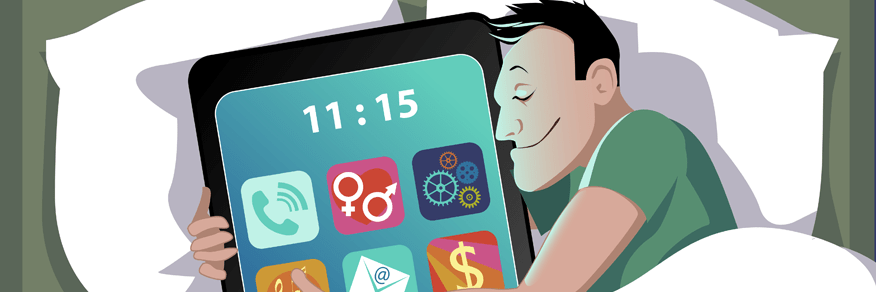You can no longer deny that smartphones have become an inseparable part of everyday life. Should we embrace the benefits or should we worry?
Not so long ago, people who were constantly tapping their thumbs on the screen, with their faces illuminated, were laughed at. They were considered stupid for being so easily seduced by the superficial entertainment box called a smartphone. Eight years later, literally everyone has a tiny computer within reach. Waiting for the bus, sitting in the train, during class or during break, sitting on the couch: the little all-rounder is present, always and everywhere.
More and more publications are appearing about the impact of smartphones on our daily life, and the pros and cons of using them are often the topic of discussion. Should we worry about our excessive use of smartphones? Or is it another cry for attention by anxious technophobes.
‘We are facing serious attention problems’
Hans Schnitzler, philosopher and writer, started a conversation with people who took part in a digital detox experiment. Read more about his book on the philosophy of digital abstinence here.
If we look at the participants’ experiences that Schnitzler describes in his book, using a smartphone has many negative impacts on how we experience life. Feeling more real or present, being able to have profound conversations and having way more attention for your surroundings, were things that came forward as the detoxers put away their smartphones for a week.
“We are facing serious attention problems,” Schnitzler says. “Attention is a fundamental human and intimate capacity that is about how we relate to each other. It is about connection, bonding, love and devotion. If we lose that power, we will be further away from making offline connections. Disconnecting from the online world is becoming harder and harder.”
In a world where achievement and results are leading, not having to pay attention might feel like a relief. Perhaps those few minutes in your own world while waiting for the bus, could actually be quite relaxing.
“The applications on your smartphone are so smart that they are constantly pulling you in. This is where the absent presence cultivates. The applications are addictive, that is how they are designed,” Schnitzler says. “They are also called digital sugar.”
‘It is just a tool that makes life easier’
The social-historical point of view often argues that we don’t need to panic because every great technology has run into resistance because people are often just afraid of something new. The train drastically changed the way we experience travel and therefore how we reflect upon life. Why is the innovation of smartphones considered so much more dangerous for our health, concentration or happiness?
“It is not the technology that harms us, it is the revenue model behind it that does the damage,” says Schnitzler. For many people, the advantages of being able to easily find their route, stay connected or have access to infinite entertainment, outweigh the potential downsides. They don’t see the harm in having a smartphone. “It is just a tool that makes life easier” is an argument of the man at the Apple store in Amsterdam. “If you have such a big problem with it, just stop using it.”
To what extent are you really free to choose? In a world where sharing is caring and being online is the status quo, you might become an outcast if you don’t have a smartphone.
According to Schnitzler, the responsibility partly lies with the user and is about becoming aware of your digital habits. “Those digital habits might conflict with your ambitions and desires. It is something you should deal with yourself.”
‘We are expected to share everything and to be online constantly’
However, he says, adjusting your behaviour isn’t easy at all. “We are expected to share everything and to always be online. That’s where the government should come in.” The first task of the government should be to warn people about the addictive character of smartphones, according to Schnitzler. “Just like they do with alcohol and cigarettes.”
Secondly, Schnitzler argues, the government should protect our data. “Silicon Valley’s revenue model means that technology is designed to let us swipe as much as possible.” Swiping generates data and large amounts of data can give companies such precise information about the consumer that it is currently the most valuable currency. “It is about human integrity. And it is for the government to protect it,” Schnitzler states. “Commercially exploiting our data should not be possible.”
The smartphone has opened the door to a new world where everything seems malleable. Our appearance, intelligences or social network aren’t limited by the boundaries set by the physical world anymore. Everything can be and is calculated. Nothing is left to chance. Yet to what extent are we the ones that shape this world?
Myrthe Smedes
About fifteen Science Communication master students take the subject Science Journalism at TU Delft every year. One of their assignments is to write a feature article on their original field of expertise. Myrthe Smedes is one of them. She has a Bachelor’s degree in Mechanical Engineering and combines a Science Communication master with a Philosophy master in Amsterdam. She attended the journalism course last year and wrote this article. Delta asked her to publish it here on the Delta Lab to encourage this year’s students to do the same, so keep an eye out for their articles.
With many thanks to InterSECtion, the study association of the master study Science Education and Communication
Delta Lab / Delta Lab offers you the opportunity to share anything you really care about with the entire University community. E-mail us at delta@tudelft.nl.



Comments are closed.